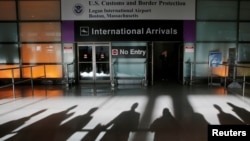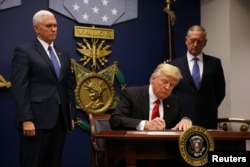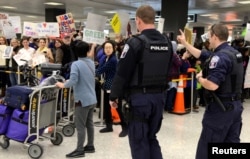President Donald Trump’s order restricting travel now goes into effect in its entirety - for the first time since the original travel order was signed last January.
The nation’s highest court, the Supreme Court, okayed the order Monday with one important caveat: it still has to make its way through two appeals courts, both of which have scheduled hearings later this week.
“The Supreme Court said there should be a full implementation pending merits and explicitly noted they believe that the merits hearings would be happening expeditiously,” Betsy Fisher, policy director at the International Refugee Assistance Project, told VOA.
Seven of the High Court justices ruled in favor of the administration, while two - Ruth Bader Ginsburg and Sonia Sotomayor - said the partial stay on the ban should continue.
The court did not give a reason for its decision.
The travel order has been mired in the courts for almost a year during which time the Trump administration has re-written it three times. The third version is the one the Supreme Court ruled on Monday.
At issue is the government’s desire to ensure national security while pro-immigration groups that have sued to stop the order say it is discriminatory and amounts to a ban on Muslims.
What now?
The new order alters a previous Supreme Court order in June regarding the second version of the travel order. In that ruling, the justices said that anyone with “bona fide” relationships to the U.S. must be allowed to enter. Relationships included family, school and business ties.
Both the Fourth and Ninth Circuit Appeals Courts applied that ruling to travel order 3 in the last two months, ruling the travel could take effect except for those with bona fide relationships.
Now, with the Supreme Court decision, the entire order may be implemented. But the latest ruling is not conclusive, and Fisher says it was procedural.
“So cases can go back and forth, and in this instance it's a preliminary decision and that once [they hear] the merits, it could go back. I think last time (in June) we saw that the Supreme Court seemed hesitant in weigh in and I think [they] would like to see the appeals court resolve it,” she said.
For now, travelers from six Muslim-majority countries are banned to varying degrees. The countries include Chad, Iran, Libya, Somalia, Syria, and Yemen. Restrictions against Venezuela and North Korea, also included in travel order 3, have been allowed to take effect.
The Trump administration had tailored travel ban 3 to each of the individual countries, for instance, banning only Iranian students, and prohibiting immigrants from Somalia, while allowing visitors.
Mixed reaction
Angie Plummer, the director of Community Refugee and Immigration services (CRIS) says the decision is upsetting lives for many refugees who have been dreaming of one day resettling in the U.S. She says more than 100 Somali families whose family members got approved are on hold.
“This is devastating to them [refugees]; we have so many people who have followed the rules and they applied some as many as five years ago, they paid [for] the DNA tests, they were approved and what it does to their emotional state is horrible,” she said.
“What we have, you know, a caseload of several hundred people and only some of them are active right now, many of them are on hold, almost all the Somali cases are on hold.”
Attorney General Jeff Sessions called Monday's ruling a "substantial victory for the safety and security of the American people," and said Trump's travel ban is necessary to protect the country from threats.
A lawyer for the Trump administration argued that some foreign governments are deficient in sharing information about those seeking U.S. visas, posing a possible risk to the United States.
White House Deputy Press Spokesman Hogan Gidley said Monday's Supreme Court decision is not surprising and it is "essential to protecting our homeland."
But the Council on American-Islamic Relations again called the travel order a Muslim ban.






